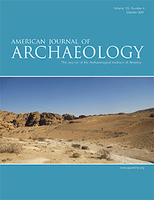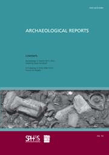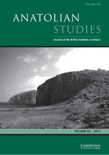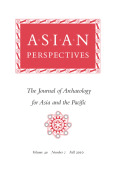
Anadolu Arastirmalari-Anatolian Research
metrics 2024
Advancing Knowledge in Anatolian Studies
Introduction
Anadolu Arastirmalari-Anatolian Research, published by ISTANBUL UNIVERSITY, is a prominent open-access journal dedicated to the exploration of history, archaeology, and related fields. Since its transition to open access in 2017, the journal has become a vital resource for scholars and practitioners, facilitating the dissemination of innovative research findings. With a strong focus on the intricacies of Anatolian history and archaeology, the journal has earned notable recognition, achieving a Q1 ranking in History and Q2 rankings in both Archaeology and Arts and Humanities categories as of 2023. This positions it among the foremost journals in its field, providing an essential platform for interdisciplinary research and discourse. The journal's impact factor is evidenced by its significant citation metrics and rigorous editorial standards, aiming to contribute meaningfully to scholarly dialogue and knowledge production. Researchers, professionals, and students alike will find this journal indispensable for understanding the rich tapestry of Anatolian culture and heritage.
Metrics 2024
 0.22
0.22 0.20
0.20 -
- 2
2Metrics History
Rank 2024
Scopus
IF (Web Of Science)
JCI (Web Of Science)
Quartile History
Similar Journals

Journal of Ancient History and Archaeology
Unveiling the Secrets of Our PastJournal of Ancient History and Archaeology is a premier, open-access academic journal published by MEGA PUBLISHING HOUSE since 2014, dedicated to exploring the rich tapestry of ancient civilizations and archaeological discoveries. With ISSN 2360-266X, this journal has made significant strides in the field, achieving elevated rankings across multiple categories, including Q1 in Classics and Q2 in History as of 2023. Positioned in Romania, the journal serves an international audience of researchers, professionals, and students who seek to disseminate and access influential scholarship in ancient history and archaeology. As a prominent resource within the Scopus rankings, it reflects a robust commitment to advancing knowledge through quality research, making it a vital platform for the sharing and discussion of innovative ideas and methodologies. The journal covers a wide array of topics related to ancient societies, enhancing our understanding of their cultural, historical, and archaeological significance.

Gerion-Revista de Historia Antigua
Fostering Interdisciplinary Insights into AntiquityGerion-Revista de Historia Antigua is a prestigious academic journal published by UNIV COMPLUTENSE MADRID, SERVICIO PUBLICACIONES. Since its inception in 1983, this Open Access journal has been a vital platform for researchers and scholars in the fields of Archaeology, History, and Classics. Based in Madrid, Spain, the journal promotes rigorous scholarship and dissemination of knowledge covering a broad spectrum of ancient history and artifacts. With its impressive quartile rankings—Q1 in Classics and Q2 in both History and Archaeology—Gerion demonstrates a strong commitment to academic excellence, boasting a respectable presence within Scopus rankings. Researchers will find a collaborative space here, as the journal aims to support interdisciplinary dialogue and foster a deeper understanding of ancient civilizations. With its dedicated approach to quality and accessibility, Gerion is essential for anyone engaged in the study of our historical past, making it a valuable resource for students, professionals, and academics alike.

AMERICAN JOURNAL OF ARCHAEOLOGY
Illuminating History Through Rigorous ResearchThe American Journal of Archaeology (ISSN: 0002-9114, E-ISSN: 1939-828X), published by the esteemed University of Chicago Press, stands as a leading scholarly journal in the field of archaeology, celebrated for its rigorous peer-reviewed research. With an impressive impact factor that places it in the Q1 quartile for both archaeology and archaeology within the arts and humanities, this journal ranks among the top 15% in its field, according to Scopus metrics. It serves a global audience of researchers, professionals, and students, facilitating the dissemination of innovative findings from excavations, historical analyses, and methodological advancements. While primarily available through subscription, the journal's archives and features provide invaluable resources for deepening one's understanding of the past and engaging with current archaeological discourse. Operating from its home in Chicago, USA, the American Journal of Archaeology actively contributes to the advancement of knowledge and scholarship in archaeology, making it an essential platform for those invested in the exploration of ancient civilizations and cultural heritage.

Lanx-Journal of the Scuola di Specializzazione in Archeologia of the University of Milan
Exploring cultural heritage through innovative research.Lanx-Journal of the Scuola di Specializzazione in Archeologia of the University of Milan, published by Milano University Press, is a distinguished platform dedicated to the field of archaeology. Committed to advancing archaeological research and scholarship, this Open Access journal has been available to the global academic community since 2008, facilitating easy dissemination of innovative ideas and findings. With a strong emphasis on promoting interdisciplinary dialogue, the journal covers a wide range of topics from classical archaeology to contemporary practices, making it an invaluable resource for researchers, professionals, and students in the field. Situated in the historic city of Milan, it aims to contribute to the preservation and understanding of cultural heritage through rigorous academic inquiry and collaboration.

Ancient Civilizations from Scythia to Siberia
Advancing Knowledge of Eurasia's Historical HeritageAncient Civilizations from Scythia to Siberia, published by BRILL, is a pivotal journal dedicated to the exploration and scholarly analysis of ancient cultures in Eurasia, with a focus spanning from the Scythian tribes to the Siberian territories. With an ISSN of 0929-077X and an E-ISSN of 1570-0577, this journal plays a significant role in the fields of Archeology, Classics, and History, holding esteemed rankings in Q3 and Q1 categories, thus affirming its status in the academic community. Covering a wide temporal range from 1995 to 2024, the journal aims to provide a comprehensive platform for researchers and students to disseminate their findings and foster collaborative discourse. With impact rankings in the 86th and 75th percentiles for Classics and History, respectively, it is recognized for its high-quality contributions that advance knowledge in these areas. Although currently not an open-access journal, it offers various options for accessing its rich content. By bridging gaps in historical understanding and engaging with the complexities of ancient societies, Ancient Civilizations from Scythia to Siberia remains an essential resource for those passionate about uncovering the narratives of our past.

Aula Orientalis
Bridging Disciplines in Near Eastern StudiesAula Orientalis, an esteemed academic journal published by the Universitat de Barcelona's Institute of Ancient Near Eastern Studies, serves as a vital platform for scholarly discourse in the field of Near Eastern Archaeology, History, and Philology. With an ISSN of 0212-5730, this journal aims to disseminate high-quality research, fostering a deeper understanding of the ancient Near East through the publication of articles, reviews, and discussions by leading experts and emerging scholars alike. Although the journal has undergone changes in its indexing status, it continues to maintain a focus on rigorous academic standards and relevance in the global research community. Positioned at the crossroads of history and archaeology, Aula Orientalis encourages interdisciplinary collaboration and is ideal for researchers, professionals, and students seeking to expand their knowledge and engage with contemporary issues in ancient studies.

Bulletin of the American Society of Overseas Research
Bridging gaps in knowledge with innovative research and discourse.Bulletin of the American Society of Overseas Research, published by the University of Chicago Press, serves as a premier platform for scholarly discourse in the fields of archaeology, cultural studies, and history. With its ISSN 2769-3600 and E-ISSN 2769-3589, this journal has swiftly established itself as a key resource for researchers, professionals, and students alike, demonstrating exceptional impact as evidenced by its Q1 rankings in multiple relevant categories for 2023. Notably, it holds the 93rd percentile rank in Arts and Humanities (History) and the 84th percentile in Social Sciences (Cultural Studies), evidencing its respected standing within the academic community. The journal's commitment to advancing knowledge and fostering interdisciplinary dialogue is complemented by its accessible publication from 2022 to 2024, making it an essential read for those engaged in the exploration of global cultural histories and archaeological research.

Archaeological Reports-London
Illuminating Our Heritage, One Report at a TimeArchaeological Reports-London, published by Cambridge University Press, is a prominent journal dedicated to advancing the field of archaeology, encompassing a comprehensive range of studies that delve into the rich tapestry of human history from prehistory to modern times. With an ISSN of 0570-6084 and an E-ISSN of 2041-4102, this journal has been a significant source of scholarly articles since its inception in 1955, serving as a crucial platform for researchers and academics alike. The journal is categorized in the third quartile for Archaeology and Arts and Humanities, and holds a prestigious position in the first quartile for Classics, reflecting its vital role in the scholarly community. With its esteemed ranking of Rank #45/170 in Classics and Rank #210/413 in Archaeology, it provides unparalleled insights and findings that shape contemporary archaeological discourse. Although not an open-access publication, the journal remains key for those who seek to enrich their understanding of archaeological practices and heritage conservation. Engage with Archaeological Reports-London to explore cutting-edge research that illuminates our understanding of past civilizations and informs future directions in the field.

Anatolian Studies
Connecting Past and Present Through Scholarly InquiryAnatolian Studies, published by Cambridge University Press, stands as a premier forum for research in the fields of archaeology, cultural studies, and history. Established in 1951, this esteemed journal has consistently contributed to the academic discourse surrounding the rich and multifaceted history of Anatolia, earning its place in the Q1 category across multiple disciplines. With a notable impact factor reflected in its Scopus rankings, it ranks among the top journals in its fields: 78th in History, 155th in Cultural Studies, and 55th in Archaeology, showcasing its significant influence and recognition. This journal serves as an invaluable resource for researchers and scholars seeking to delve into the intricacies of Anatolian heritage, providing a platform for innovative research and critical discussion within the academic community. While it currently does not offer open access, Anatolian Studies continues to enrich scholarly resources and advance knowledge within its key areas of focus.

Asian Perspectives-The Journal of Archaeology for Asia and the Pacific
Exploring Diverse Narratives: The Heart of Asia and the PacificAsian Perspectives - The Journal of Archaeology for Asia and the Pacific is a prestigious journal published by University of Hawaii Press, focusing on the intricate field of archaeology in Asia and the Pacific. With a rich publication history dating back to 1993, the journal has established itself as a vital platform for disseminating research that illuminates the archaeological heritage and cultural dynamics of this diverse region. Recognized for its scholarly impact, it enjoys a commendable impact factor and ranks in the Q2 category for Anthropology and Archaeology, indicating its significant contribution to these fields. Although it operates on a traditional subscription-based model, the journal is accessible to institutional and individual subscribers worldwide. With an emphasis on interdisciplinary research, Asian Perspectives invites contributions that foster a deeper understanding of historical and contemporary issues through archaeology, making it an invaluable resource for researchers, professionals, and students alike committed to advancing scholarly dialogue in the region. Explore a wealth of innovative studies and insights that continue to shape the understanding of Asia and the Pacific's archaeological narrative.